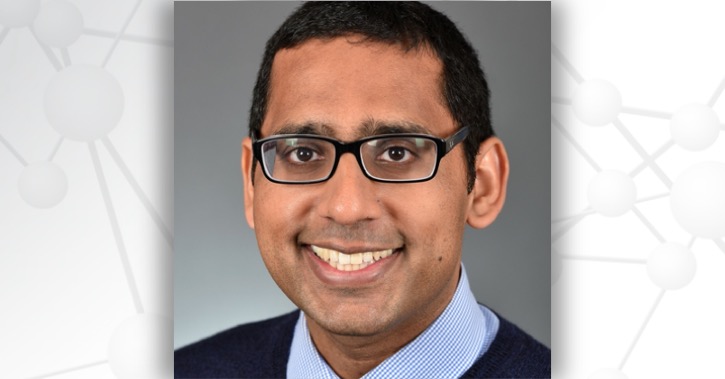Siddharth Srivastava, MD, is a pediatric neurologist at Boston Children's Hospital specializing in neurogenetics. He is also a member of the Developmental Synaptopathies Consortium (DSC). Dr. Srivastava’s research focuses on neurodevelopmental phenotyping and biomarker discovery in Phelan-McDermid syndrome (PMS), tuberous sclerosis complex (TSC), and PTEN hamartoma tumor syndrome (PHTS). Here, he shares his start in rare disease research, exciting discoveries, and future goals.
How and why did you get involved with rare disease research?
My research interest in neurogenetics and neurodevelopmental disabilities began in medical school at Johns Hopkins. During the summer between first and second year, I began working with Dr. Marco Grados on a research project characterizing the behavioral phenotype of children with Cornelia de Lange syndrome. Spending time talking to affected families and listening to their stories, I quickly realized that a remarkable sense of perspective and insight existed among parents and caregivers of children with developmental disabilities.
Inspired by this experience, I decided to pursue training in child neurology and neurodevelopmental disabilities at the Kennedy Krieger Institute, which further cultivated my passion for neurogenetics and rare disease research. Over the four years of my residency, I provided care for numerous children with a wide range of neurological and developmental presentations, including the full spectrum of intellectual disability, autism spectrum disorder (ASD), cerebral palsy, epilepsy, and challenging behaviors.
With increasing clinical exposure, I quickly realized that many of these children have underlying genetic disorders. Identifying the etiology influences so many aspects of patient care, like prognosis, management, and treatment. I made it a mission to study these genetic causes of neurodevelopmental disorders with the goal of developing targeted treatments using precision medicine.
When did you join the DSC as an early stage researcher?
In 2016, I joined Boston Children's Hospital as a neurogenetics fellow, with Dr. Mustafa Sahin as my primary research mentor. My interests gravitated to the area of developmental synaptopathies, like PMS and PHTS. Given that the synapse is a fundamental unit of learning and memory, studying disorders of the synaptic machinery can lead to insights that may be applicable to other childhood genetic diseases impacting cognition and behavior.
For these disorders, I use a multi-modal approach involving comprehensive neurodevelopmental phenotyping and biomarker identification. This approach delineates appropriate targets for therapy in future clinical trials aimed at improving developmental outcomes.
What were your experiences working with the DSC and how has the experience shaped your research career?
The experience working with the DSC has been tremendous. First and foremost, the families are a source of inspiration. They devote countless hours of time and effort, and we as clinicians/scientists are quite privileged to be able to work with them and learn from their experiences.
Second, the collaborative spirit of this consortium is truly outstanding. There are so many players involved across all levels, and everyone is truly motivated to work together to make this consortium successful.
Can you share a recent discovery with us, and what it adds to our knowledge of the field?
Using data from the DSC, we helped characterize the neurodevelopmental phenotype of PHTS and PMS.
We compared the neurodevelopmental profile of participants with PHTS and autism to two other groups: participants with non-syndromic ASD with macrocephaly and participants with PHTS without ASD. We showed that PHTS is associated with a distinct neuropsychological profile suggestive of defects in frontal lobe systems. We also showed that individuals with PHTS and ASD have more severe impairments in cognition, adaptive behavior, and sensory systems compared to individuals with PHTS without ASD. These findings help inform assessment and treatment of neurobehavioral symptoms associated with PHTS, with and without ASD.
We have also studied the neurodevelopmental profile of PMS. Repetitive behaviors are prominent within this disorder. We demonstrated that individuals with PMS have lower rates of repetitive behaviors compared to previous studies of individuals with ASD and Fragile X syndrome. We also showed that more severe motor repetitive behaviors (e.g., body rocking, finger movements) are associated with lower IQ scores in PMS, but this relationship was not present between IQ and other types of repetitive behaviors. These findings indicate that repetitive behaviors may be milder overall in PMS compared to previous studies characterizing ASD and other genetic conditions. Stereotyped motor behaviors may be related to level of cognitive functioning, and not an ASD diagnosis, in PMS. We need to better understand these findings by continuing to study repetitive behaviors in PMS using objective measures.
Where are you heading next with your research?
There are a tremendous number of avenues to investigate. Right now, we are focusing on the longitudinal trajectory of both PHTS and PMS. We are trying to determine what factors—whether genotype, age, sex, seizure history, or other clinical factors—influence the developmental and behavioral trajectory. We are also helping to develop updated consensus-based clinical guidelines on managing these conditions.
What advice would you offer to other early stage researchers?
Be enthusiastic, passionate, curious, and kind! Opportunities will naturally follow.
The Developmental Synaptopathies Consortium (DSC) is part of the Rare Diseases Clinical Research Network (RDCRN), which is funded by the National Institutes of Health (NIH) and led by the National Center for Advancing Translational Sciences (NCATS) through its Division of Rare Diseases Research Innovation (DRDRI). DSC is funded under grant number U54NS092090 as a collaboration between NCATS, the National Institute of Neurological Disorders and Stroke (NINDS), the Eunice Kennedy Shriver National Institute of Child Health and Human Development (NICHD), and the National Institute of Mental Health (NIMH).


